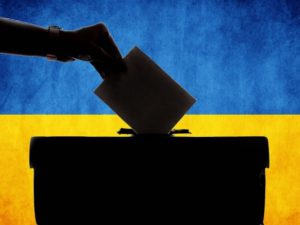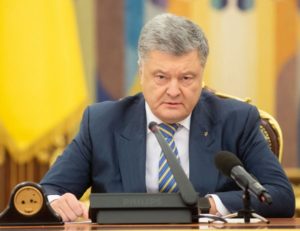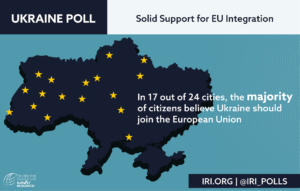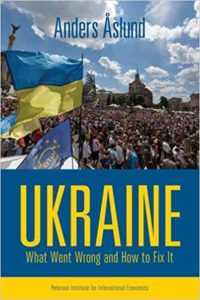It seems that, on March 31, Ukraine once again received a chance to accelerate its transformation, notes Brookings analyst Sergey Aleksashenko. Ukraine hosted the first round of presidential elections, with 39 candidates participating. Exit polls show Volodymyr Zelensky came in first, with more than 30 percent, followed by the incumbent president Petro Poroshenko who garnered 16 percent of votes. The second round will be held on April 21.
Atlantic Council analyst Melinda Haring explains why Zelenskiy won the first Round of Ukraine’s elections. Zelenskiy may be a self-made millionaire, but he will have to better explain his relationship with the notorious oligarch Ihor Kolomoisky, who owns 1+1, the TV channel that airs Zelenskiy’s shows, she writes for Foreign Affairs:

Tech 4 Dem
Kolomoisky and Poroshenko became bitter rivals after the president nationalized Kolomoisky’s PrivatBank in late 2016; an independent audit by the corporate investigations consultancy Kroll showed that oligarchs had looted the bank to the tune of $5.5 billion. Some experts claim that Kolomoisky is the mastermind behind the rise of Zelenskiy and that the comedian is nothing more than malleable clay in the hands of an oligarch who wants revenge. (Of course, Poroshenko is himself an oligarch with links to a number of unsavory people who have stolen from the state budget.)
Fundamental change comes with the construction of ideas-driven movements and parties, and installing them in power, argues Volodymyr Ishchenko, a sociologist studying social protests in Ukraine. Zelenskiy’s huge electoral success is partly a result of the large increase in turnout in mostly Russian-speaking south-eastern regions. Hopefully this mobilisation for change will not end at the ballot box, he writes for the Guardian.
It’s hard to know how Zelensky, if he maintains his momentum, can deliver on ending corruption, nepotism and impunity, says Carnegie Europe’s Judy Dempsey.

Credit: Wikimedia Commons
“Other signs to watch for include the treatment of Ukraine’s outspoken civil society activists and the ability of the country’s new anti-corruption institutions to investigate and prosecute officials,” adds Haring, a former Penn Kemble fellow at the National Endowment for Democracy. “The outcome of the parliamentary elections, together with the presidential one, will show just how serious Ukraine really is about leaving behind a system that enriches elites and impoverishes everyone else.”
Civil society groups like my organization, the Anti-Corruption Action Organization (AntAC), have exposed Ukraine’s discredited Prosecutor General Yuriy Lutsenko, Daria Kaleniuk writes for The Hill:
- First, we have consistently criticized Lutsenko for covering up corruption and undermining the reform of the prosecutor’s office. In addition, Lutsenko’s Prosecutor General’s Office (PGO) has been systematically attacking the newly established National Anti-Corruption Bureau, which is doing outstanding work and has tried to bring 189 cases to justice; we drew public attention to this pressure. AntAC published an article explaining how the PGO failed to investigate the corruption of former President Yanukovych, which caused the European Union (EU) to waive personal sanctions against 10 out of 22 ex-officials of Ukraine sanctioned by the EU in early 2014. Together with other civil society organizations, we have criticized Lutsenko for refusing to investigate dozens of physical attacks on activists. For obstructing justice, undermining reforms, covering perpetrators of human rights violations and alleged corruption, Lutsenko should be added to the U.S. Office of Foreign Assets Control list.
- Second, since 2016, AntAC has faced a series of well-planned attacks from various corrupt officials and oligarchs. Smear campaigns on national TV owned by oligarchs, fake news, political harassment, physical attacks, U.S. lobbyists hired to intimidate AntAC in foreign media and among decision-makers in the West — we’ve seen all that.
To sustain the rule-of-law reforms and break the vicious cycle of corruption and impunity, Ukraine cannot survive without U.S. assistance and support, Kaleniuk adds.
 Ukraine’s election is a test of the strength of its democracy, argues IRI’s Daniel Twining. The United States, Europe, and the international community have a compelling interest in ensuring that Ukraine remains on the path toward a stable, prosperous and pro-Western future, which a resilient democracy can deliver, he writes for Foreign Policy:
Ukraine’s election is a test of the strength of its democracy, argues IRI’s Daniel Twining. The United States, Europe, and the international community have a compelling interest in ensuring that Ukraine remains on the path toward a stable, prosperous and pro-Western future, which a resilient democracy can deliver, he writes for Foreign Policy:
While the West stands with Ukraine in these elections, it is ultimately up to the Ukrainian authorities to ensure a free and transparent election, and to the Ukrainian people to hold officials accountable. Anything less than a legitimate process would be a setback in Ukraine’s democratic journey and a victory for the Kremlin. While it’s anyone’s guess who the next president will be, the stakes couldn’t be clearer.
The Atlantic Council held two April 1 roundtable discussions of Ukraine’s March 31 presidential election (above), the Kyiv Post adds.
The first-panel speakers:
 Anders Aslund, senior fellow, Eurasia Center Atlantic Council; Carl Gershman, president, National Endowment for Democracy; Nataliya Bugayova, director of development and research fellow, Russia team, Institute for the Study of War; and U.S. Ambassador John Herbst, director of the Eurasia Center for the Atlantic Council. The talk was moderated by Melinda Haring, editor for UkraineAlert, Eurasia Center for the Atlantic Council.
Anders Aslund, senior fellow, Eurasia Center Atlantic Council; Carl Gershman, president, National Endowment for Democracy; Nataliya Bugayova, director of development and research fellow, Russia team, Institute for the Study of War; and U.S. Ambassador John Herbst, director of the Eurasia Center for the Atlantic Council. The talk was moderated by Melinda Haring, editor for UkraineAlert, Eurasia Center for the Atlantic Council.
The second-panel speakers:
David J. Kramer, team lead, senior fellow, Vaclav Havel Program for Human Rights and Diplomacy, Steven J. Green School of International and Public Affairs; Ukrainian Election Task Force; Florida International University; Laura Galante, cyber lead; senior fellow, Eurasia Center, Ukrainian Election Task Force; Atlantic Council; Jakub Kalensky, disinformation lead; senior fellow, Eurasia Center, Ukrainian Election Task Force; Atlantic Council; Oleksiy Melnyk, Kinetic Lead; co-director, foreign relations and international security programs; Ukrainian Election Task Force, Razumkov Center. The panel is moderated for Geysha Gonzalez, deputy director, Eurasia Center, Atlantic Council.







